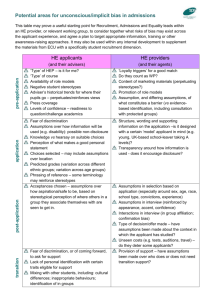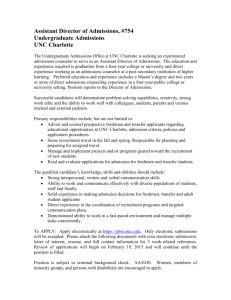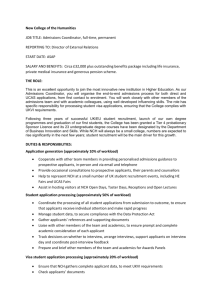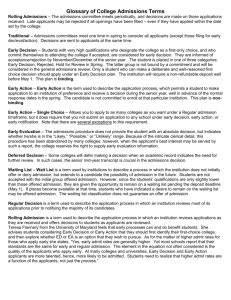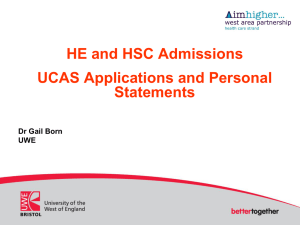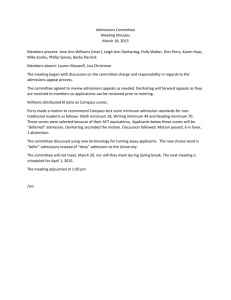3B Recruitment, Selection and Admission
advertisement
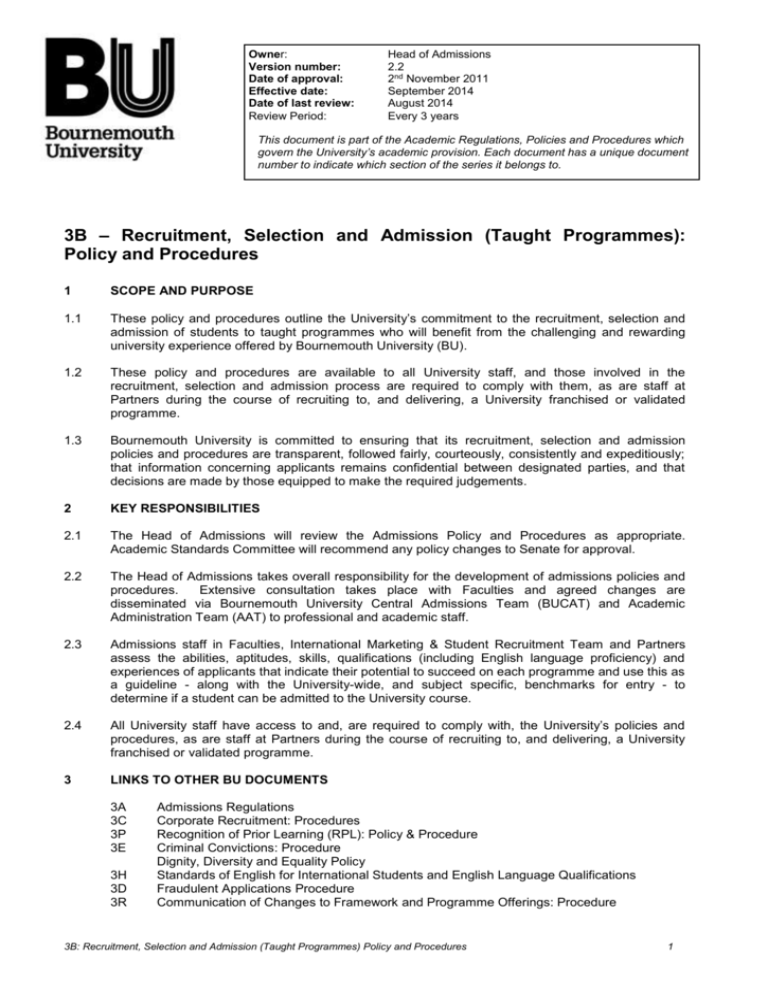
Owner: Version number: Date of approval: Effective date: Date of last review: Review Period: Head of Admissions 2.2 2nd November 2011 [Title] Policy September 2014 August 2014 Every 3 years This document is part of the Academic Regulations, Policies and Procedures which govern the University’s academic provision. Each document has a unique document number to indicate which section of the series it belongs to. 3B – Recruitment, Selection and Admission (Taught Programmes): Policy and Procedures 1 SCOPE AND PURPOSE 1.1 These policy and procedures outline the University’s commitment to the recruitment, selection and admission of students to taught programmes who will benefit from the challenging and rewarding university experience offered by Bournemouth University (BU). 1.2 These policy and procedures are available to all University staff, and those involved in the recruitment, selection and admission process are required to comply with them, as are staff at Partners during the course of recruiting to, and delivering, a University franchised or validated programme. 1.3 Bournemouth University is committed to ensuring that its recruitment, selection and admission policies and procedures are transparent, followed fairly, courteously, consistently and expeditiously; that information concerning applicants remains confidential between designated parties, and that decisions are made by those equipped to make the required judgements. 2 KEY RESPONSIBILITIES 2.1 The Head of Admissions will review the Admissions Policy and Procedures as appropriate. Academic Standards Committee will recommend any policy changes to Senate for approval. 2.2 The Head of Admissions takes overall responsibility for the development of admissions policies and procedures. Extensive consultation takes place with Faculties and agreed changes are disseminated via Bournemouth University Central Admissions Team (BUCAT) and Academic Administration Team (AAT) to professional and academic staff. 2.3 Admissions staff in Faculties, International Marketing & Student Recruitment Team and Partners assess the abilities, aptitudes, skills, qualifications (including English language proficiency) and experiences of applicants that indicate their potential to succeed on each programme and use this as a guideline - along with the University-wide, and subject specific, benchmarks for entry - to determine if a student can be admitted to the University course. 2.4 All University staff have access to and, are required to comply with, the University’s policies and procedures, as are staff at Partners during the course of recruiting to, and delivering, a University franchised or validated programme. 3 LINKS TO OTHER BU DOCUMENTS 3A 3C 3P 3E 3H 3D 3R Admissions Regulations Corporate Recruitment: Procedures Recognition of Prior Learning (RPL): Policy & Procedure Criminal Convictions: Procedure Dignity, Diversity and Equality Policy Standards of English for International Students and English Language Qualifications Fraudulent Applications Procedure Communication of Changes to Framework and Programme Offerings: Procedure 3B: Recruitment, Selection and Admission (Taught Programmes) Policy and Procedures 1 3J 3L 11F 3T Academic Progression (International Admissions): Procedure Fee Status: Guidelines Students Complaints Policy and Procedures University’s Fair Access Agreement U18 Policy Transgender Policy Admissions Appeals and Complaints: Procedure BU International College Operations Manual Policy 4 GENERAL PRINCIPLES 4.1 Bournemouth University’s policies, procedures and guidelines for the recruitment, selection and admission of students are based on the following principles: i ii iii iv v the University’s commitment to academic standards; the identification of students who are likely to succeed in the University’s programmes; the encouragement of broad access to the University’s academic programmes by students from diverse backgrounds as emphasised in the University Fair Access Agreement; equity of opportunity for all applicants. There shall be no discrimination against any applicant in relation to age, colour, creed, disability, ethnic origin, gender, marital status, nationality, race, sexual orientation or social class; fair, consistent and transparent application by staff who are well trained and have access to, and comply with, the University’s policies and procedures, including those at partners. 4.2 Policies and procedures related to admissions are reviewed regularly to ensure that they continue to support the mission and strategic objectives of the University, and that they remain current and valid in the light of changing circumstances. 4.3 Academic Standards 4.3.1 Entry criteria, which may vary from programme to programme, are set by Faculties using Universitywide and subject-specific benchmarks and are widely published. BUCAT reviews and ratifies changes to entry criteria. 4.3.2 For University validated programmes that are delivered at Academic Partners, Faculties and the Partner should agree recruitment, selection and admission criteria based on University policies. 4.3.3 For programmes that are jointly ratified by the University and a Professional Body, criteria for entry will also meet any requirements specified by the Professional Body. 4.3.4 Applicants whose first language is not English will be required to demonstrate competency in the four components of English: Listening, Speaking, Reading and Writing, normally by means of a recognised qualification such as IELTS or completion of the University’s Pre-Sessional English for University Study Programme). As a minimum, results will be in line with Home Office requirements and are currently, for the majority of courses, IELTS (Academic) 6.0 (with a minimum of 5.5 in each of the four component scores) or equivalent. It should be noted that the language requirement may be higher for some programmes, in particular those which require a high level of communication skills. 4.3.5 Applicants to certain programmes will be required to undergo selection tests, including interviews, occupational health and/or Disclosure Barring Service and Barred List checks, the outcomes of which will be taken into consideration as part of the admissions process. 3B: Recruitment, Selection and Admission (Taught Programmes) Policy and Procedures 2 4.4 Success in the University’s Programmes 4.4.1 There should be a reasonable expectation that anyone admitted to a programme of study will be able to fulfil the learning outcomes of the programme and achieve the standard required for an award available within the programme. 4.4.2 The ability to successfully complete and benefit from a programme should be the basic criterion for admission, and this is not necessarily best evidenced by the highest possible entry grade at A-level or equivalent. 4.4.3 In considering each individual applicant for admission to a programme of study, evidence should be sought of personal, professional and educational experiences that provide indications of ability to meet the demands of the programme. 4.5 Fair Access 4.5.1 Bournemouth University’s policies and procedures for the recruitment, selection and admission of students are designed to meet the University’s widening participation agenda. The University’s Fair Access Agreement is approved annually by the Office for Fair Access and includes information about fees, bursaries and scholarships applicable to Bournemouth University campus and franchised programmes, and outlines the University’s use of contextual data in admissions. 4.5.2 Bournemouth University is committed to Equal Opportunities for both students and staff and to widening participation. The Dignity, Diversity and Equality Policy states: ‘Bournemouth University is committed to both the elimination of unlawful discrimination and the positive promotion and celebration of equality and diversity. The University will not tolerate unfair or unlawful treatment on the grounds of disability, gender, marital status, race, colour, ethnic origin, sexual orientation, age, nationality, trade union membership and activity, political or religious beliefs.’ 4.6 Fair, consistent and transparent application of policies and procedures 4.6.1 All applications (including those from staff, their relatives or others associated with the University) will be considered on equal merit and using transparent entry requirements, both academic and nonacademic to underpin the judgements that are made during the selection process for entry. 4.6.2 Each Faculty and Academic Partner is responsible for the recruitment, selection and admissions of its students. The number of places within each Faculty or Partner and programme is agreed between the Faculty and the University management, via BUCAT. BUCAT will advise programme teams on the number of offers that will need to be made in order to fill a programme. The International Admissions Team is responsible for processing all applications from non-UK applicants to Faculty based courses. Partners are responsible for processing non-UK applications. 4.6.3 The University reserves the right to pass applications to other suitable programmes for consideration when it is regarded academically beneficial; this includes passing applications to our Partners. 4.6.4 The University’s International Marketing & Student Recruitment Team work with all Faculties and Professional Services to implement University policies and admissions criteria in relation to the recruitment of EU (non-UK) and international students. 4.6.5 Admission decisions will be based on the information supplied by the applicant. It is the applicant’s responsibility to ensure that all pertinent information is supplied on his/her application. The omission of such information, or the supply of inaccurate information, may invalidate the application and, where relevant, any subsequent offer of a place. 4.6.6 All policies and procedures are published on the University website and are available in hard copy upon request to askBU future students or Academic Administration Managers. 3B: Recruitment, Selection and Admission (Taught Programmes) Policy and Procedures 3 5 RECRUITMENT 5.1 Publication of Information 5.1.1 Bournemouth University strives to ensure that promotional materials are relevant, accessible, and accurate at the time of publication, are not misleading, and provide as much information as possible to enable applicants to make informed decisions about their options. The Marketing & Communication directorate has processes which ensure the accuracy of all information published by the University. Marketing & Communications also produce an annual report on quality for the Academic Standards Committee in the autumn term. 5.1.2 Bournemouth University will endeavour to provide information in a suitable alternative format for those applicants with particular disabilities. 5.1.3 The International Marketing & Student Recruitment Team plan and co-ordinate recruitment activities aimed at non-UK students, both overseas and in the UK and ensure that all staff attending such events are briefed on appropriate processes and procedures. 5.1.4 Representatives from the UK Marketing & Student Recruitment team are involved in highlighting the University’s admissions procedures at schools and Further Education Colleges and at Higher Education Fairs across the UK. General, School/Faculty and Partner Open days also advise applicants about admissions processes and procedures. 5.2 Fees 5.2.1 Bournemouth University is committed to a fair and transparent policy in respect of all fee charges made to students, whether tuition fees or additional programme related costs. The University’s Fees Board meets quarterly and is responsible for setting fees for BU and franchised programmes. 6 SELECTION 6.1 Criteria for Entry 6.1.1 The University’s minimum admissions criteria are set out in the University’s Admissions Regulations and published on the University website. The University reserves the right to alter the criteria. However once the criteria are made public for a specified intake/calendar period, they will not be changed except in exceptional circumstances. 6.1.2 Those programmes that lead to a professional qualification or registration may also have to satisfy the requirements of the relevant professional body. 6.1.3 Any changes to entry requirements for a programme are agreed by Faculty Academic Boards/Executives and the BUCAT where appropriate. 6.1.4 Any changes to entry requirements for a programme delivered by an Academic Partner are managed by the Academic Partnerships team. 6.2 Data Protection 6.2.1 Information concerning applicants remains confidential to those processing the application at UCAS and relevant educational institutions and no aspect of any application will be disclosed to other parties unless authorised to do so by the applicant. Where a reference is requested directly by the University, the referee will be informed that the applicant is entitled to read any reference that s/he may supply. 6.2.2 In particular applications by members of staff, their relatives or others associated with the University will not be disclosed to anyone not directly involved in the decision-making process. 3B: Recruitment, Selection and Admission (Taught Programmes) Policy and Procedures 4 7 APPEALS AND COMPLAINTS 7.1 Should an applicant wish to lodge an appeal regarding the University’s admissions process, they should follow the guidelines set out in 3T Admissions Appeals and Complaints: Procedure available electronically via the website or on request. 7.2 It should be noted that appeals may only be raised with regard to the University processes and procedures and not in relation to matters of academic judgement. 3B: Recruitment, Selection and Admission (Taught Programmes) Policy and Procedures 5 Procedure 8 FAIR ACCESS 8.1 Applicants who require additional learning support (such as those with a disability, specific learning difficulty, medical condition, mental health issues and developmental disorders) will be selected using the standard criteria. However, such applicants must contact the University’s Student Services Additional Learning Support to help them make an informed decision about what support may be available before accepting an offer of a place at the University; applicants to programmes run at Partners, should contact the Partner directly. 8.2 When considering the issue of support, EU (non-UK) and international students will have access to the services offered to all students with an additional learning need. Further information about the support available can be found by looking at the Student Services Additional Learning Support website http://www.bournemouth.ac.uk/disability_support/. As non-UK students may not be eligible for public funding to support their learning needs, there may be circumstances when the University will ask the student to contribute to the funding of their support. If this occurs, students will be asked to confirm in writing that they are aware of the support available from the University and of what they would be expected to provide. 8.3 The University will use contextual data in assessing applications of students from a widening participation background. See section 10.3 for more information. 9 RECRUITMENT 9.1 Information to prospective students 9.1.1 As well as written information, the University also holds regular Open Days for applicants at undergraduate and postgraduate level throughout the year. Individual Faculties and Academic Partners hold Open Days for their programmes. Details of Open Days are available on the University website, in the Prospectus, in the local press and from askbuenquiries@bournemouth.ac.uk . 9.1.2 Information about welfare, guidance and support available to students is accessible on the website and in the prospectus, via Open Days and by request to askBU future students or Academic Administration Managers. Specific information on student support is sent directly to applicants at offer stage. 9.1.3 Programme information is accessible via the University website and from UCAS for undergraduate programmes. The askBU enquiry service also supplies information on all aspects of the programme. 9.2 Fees 9.2.1 Bournemouth University is committed to a fair and transparent policy in respect of all fee charges made to students, whether tuition fees or additional programme related costs. Information on such charges is included with the offer letter to each applicant and on the University’s website (validated programmes run at Partners excluded). 9.2.2 Fees are set annually by the University’s Fees Board and are subject to the University’s Fees Policy (validated programmes run at Partners excluded). 9.2.3 The University’s Fair Access Agreement is approved annually by the Office for Fair Access. The Access Agreement includes information about fees, bursaries and scholarships applicable to Bournemouth University and is available from OFFA at www.offa.org.uk. Full information about fees and bursaries is also available on the University website. 3B: Recruitment, Selection and Admission (Taught Programmes) Policy and Procedures 6 9.2.4 Information on the eligibility and application process for scholarships and bursaries is available on the University website. 9.3 The Application Process (for BU and Franchised provision only) 9.3.1 All applications for full-time undergraduate and Top-Up programmes should be made via UCAS. Guidance on the UCAS process is available on the UCAS website www.ucas.ac.uk. Unless otherwise stated, applicants for all part-time undergraduate and all postgraduate programmes should apply via the University’s online admissions system, accessible via the University website. 9.3.2 Applicants for Continuing Professional Development (CPD) short courses apply and pay through the online portal. Applicants should be made aware during the application process that credit-bearing short courses do not lead to the receipt of a named award, unless the applicant has sufficient academic underpinning. Students should seek advice from the Academic School/Faculty. 9.3.3 When an applicant accepts an offer of a place at Bournemouth University, they are entering into a binding agreement with BU, which includes our rules and policies. This student agreement is important and covers to matters such as progression, what happens if the student is unable to submit a piece of coursework, academic and disciplinary offences, placements, payment of fees. It is important that applicants are aware of these terms before they join us, so they must read the information carefully. The latest version of the student agreement is on our website: www.bournemouth.ac.uk/the-legal-bit. 9.3.4 International students pay a deposit for postgraduate programmes on acceptance of an offer. Failure to pay a deposit by the required deadline may result in the applicant losing their place. 9.3.5 Applicants who pay a deposit, meet their offer conditions but fail to enrol will not be eligible for a deposit refund. 9.3.7 Deferral of a place to a later intake prior to commencing the course, on one occasion only, may be granted according to the circumstances of the applicant. For postgraduate applicants the deposit is non-refundable in these circumstances. Deferral for two intakes will not normally be possible and is likely to require a new application to be submitted. 9.3.8 Postgraduate applicants who fail to meet the conditions of their offer or those who fail to secure a visa will be given one further opportunity to meet those conditions/secure a visa or to have the deposit returned. 10 SELECTION 10.1 Criteria for entry 10.1.1 For University validated programmes that are delivered at Partners, Faculties and Partners should agree recruitment and admissions criteria relating to collaborative provision based on University policies. 10.1.2 The University reviews entry criteria annually via BUCAT in sufficient time for the recruitment cycle. 10.2 Assessment of Eligibility for Entry 10.2.1 Due to the limited number of places on each programme it must be noted that attainment of published indicative entry criteria does not guarantee an offer of a place. 10.2.2 Admissions staff assess the abilities, aptitudes, skills, qualifications (including English language proficiency) and experiences of applicants that indicate their potential to succeed on each programme and use this as a guideline - along with the University-wide, and subject specific, benchmarks for entry. Admissions staff have access to qualification databases and equivalencies to aid their decisions. 3B: Recruitment, Selection and Admission (Taught Programmes) Policy and Procedures 7 10.2.3 Each applicant’s personal statement and academic reference(s) are considered alongside their academic profile. Some programmes require applicants to attend selection tests such as interviews. In this case applicants will be informed about the rationale for and requirements of any selection measures. 10.2.4 Additional references may also be requested in order to inform the admissions process. 10.2.5 If students are unable to attend in person for interview (e.g. because they are resident overseas or other reason including for reasons relating to protected characteristics), in some cases it may be possible for a telephone or video interview, or other alternative selection process, to be used. 10.2.6 The University will consider entry with advanced standing to programmes in accordance with the policy and procedures for recognition of prior learning (RPL). All RPL applications must be considered and processed in line with 3P Recognition of Prior Learning: Policy & Procedure. Subject to the availability of places, students who have successfully completed Bournemouth University Foundation degree programmes, met the performance requirement for entry and who perform satisfactorily in any selection measures, will be eligible for entry with advanced standing to named Honours Level programmes (either at Bournemouth University, an Academic Partner or a named programme at another University) and credited with 120 Level C units and 120 Level I units. Applicants undertaking a Foundation degree at another institution or those with relevant Level C and I credit from another degree are also eligible to apply. 10.2.7 Unsuccessful applicants wishing askbuenquiries@bournemouth.ac.uk 10.3 feedback on their application should contact the Applicants from a Widening Participation Background 10.3.1 BU is committed to fair access and widening participation and will use contextual data when assessing applicants from an educationally disadvantaged background. 10.3.2 BU uses three indicators to determine educational disadvantage: if the applicant lives in a low participation neighbourhood (LPN), if the applicant is or has been in care, if the applicant lives in an area with less advantaged socio-economic characteristics. Applicants will be flagged in the student record system and Faculties and Partners will give additional consideration to the application because: Opportunities for relevant work experience are fewer which is a disadvantage when this is considered favourably for some courses Support for university applications from home or school/college may be less than for other applicants No individual support to write focussed personal statements may result in a PS not normally considered worthy of offer Past educational attainment may be lower than their potential Predicted educational attainment may be lower than their potential, etc. 10.3.3 Faculties can make a differential offer (up to 60 points lower than the published tariff) based on the applicant’s whole profile and their ability to succeed on the programme in line with the guidance below: Course with single tariff point 10.4 Course with a tariff range Predicted at or above Predicted below Predicted within or above Predicted below -20 below standard offer at predicted, up to and including -60 -20 below prediction (or top of range whichever is lower) at predicted, up to and including -60 from bottom of the range Timescales for Decision-Making 3B: Recruitment, Selection and Admission (Taught Programmes) Policy and Procedures 8 10.4.1 BU places high importance on service excellence and the student experience, therefore all admissions staff adhere to University’s Corporate Recruitment Procedures (3C) (validated programmes run at Partners excluded). 10.4.2 For full-time undergraduate applicants, timescales for decision making will take into account UCAS deadlines and the University will be proactive in meeting published deadlines to support the student/applicant experience. 10.4.3 Postgraduate applicants will be kept informed of the status of their application throughout the admissions process. However, a decision will normally be made on an application within one week of receipt of the full application or following an interview. 10.5 Criminal Convictions 10.5.1 All students applying via UCAS and the University’s online admissions system are asked to declare on their application form whether they have any relevant convictions in line with the requirements of the Rehabilitation of Offenders Act (1974), whether they have unspent convictions which would not be filtered or are currently in custody. Those applicants who declare a relevant criminal conviction will be considered in line with 3E: Criminal Convictions Procedure, available on the University website. 10.5.2 All applicants for certain programmes (such as nursing, midwifery, social work etc) and some students on other programmes (those wishing to undertake placements in and organisation/role which fall under the definition of regulated activity as defined by the Disclosure Barring Service) will undergo enhanced disclosure and barred list screening by the Disclosure Barring checked in accordance with the appropriate guidelines as laid out in 3E: Criminal Convictions Procedure. 10.6 Fraudulent Applications 10.6.1 The admissions decision will be based on the information supplied by the applicant. It is the applicant’s responsibility to ensure that all pertinent information is supplied on his/her application. The omission of such information, or the supply of inaccurate information, may invalidate the application and, where relevant, any subsequent offer of a place. 10.6.2 Where an application has been detected through UCAS plagiarism software and is suspected to be fraudulent or incomplete to the extent that it is misleading, admissions staff will follow the process in 3D: Fraudulent Applications: Procedure. 10.6.3 If an application is found to be fraudulent after the point of entry to the University, the student will be dealt with under 11K: Student Disciplinary Procedure. 11 INFORMATION TO SUCCESSFUL APPLICANTS 11.1 Changes to the Programme 11.1.1 Where significant changes have been made to a published programme, those applicant holding an offer on that programme will be informed of those changes as soon as possible. Such changes may include: i ii iii iv v vi a programme not being ratified or accredited by a professional body or the University; a programme gaining validation from a professional body; major change (review) to an existing programme; major variation to the programme fees; change of location of programme delivery; the closure or suspension of a programme. 11.1.2 Applicants will have the option of withdrawing their acceptance on the programme. Should s/he wish to be considered for an alternative programme his/her application will then be assessed against the entry criteria for that particular programme, provided there is sufficient space to accommodate them. 3B: Recruitment, Selection and Admission (Taught Programmes) Policy and Procedures 9 11.2 Programme Suspension/Closure 11.2.1 In cases where it is necessary for the University to close or suspend a programme for a given period, applicants and offer holders will be notified immediately and given the option of withdrawing their acceptance or considering alternatives as above. 11.3 Enrolment and Induction 11.3.1 All applicants with a confirmed place will receive a welcome pack, in advance of the start of the programme wherever possible. This pack includes information about online registration and enrolment processes including information about the University or Academic Partner facilities, as well as its rules and regulations (validated programmes run at Partners excluded). 12 MONITORING AND REVIEW OF RECRUITMENT, SELECTION AND ADMISSION 12.1 The Head of Admissions provides timely admissions reports to the University Executive and Leadership Teams throughout the admissions cycle. BUCAT review these reports in detail as does the Academic Administration Team. 12.2 All programmes have a nominated member of staff, normally the Programme Co-ordinator/Leader, who is responsible for ensuring that policies and procedures are adhered to. In addition, each programme has at least one member of professional staff who can advise applicants about admissions processes and the progress of their application. The International Marketing & Student Recruitment Team can advise EU (non-UK) and international applicants. 12.3 The profile of students on each programme is monitored annually through Framework Management Team meetings and feeds into the Annual Report on Framework Monitoring (ARFM) process and includes consideration of age, qualifications, gender and ethnicity of new entrants together with progression and achievement statistics. This helps to inform admissions policy as well as future programme design and development. Additionally, each programme undergoes a periodic review, which examines the ongoing validity of the programme, including structure, content, mode of delivery and entry requirements. 12.4 The Head of Admissions monitors and audits admissions decisions during the admissions cycle to ensure all admissions policies, procedures and strategy are followed. 12.5 Annually the University surveys applicants who did not accept an offer of a place, in order to inform the admission process. Admission procedures may be amended in light of any pertinent findings 13 STAFF DEVELOPMENT AND TRAINING 13.1 University staff participate in national student admission agendas through membership of various professional bodies, working parties and conferences. This facilitates the dissemination of good admissions practice across the University. 13.2 Ongoing staff development is offered to staff involved in admissions, in order to ensure compliance with regulations and consistency of procedures. For example these training sessions include workshops about recruitment strategy, qualifications and entry requirements as well as technical training for staff involved in recording offers on the student record system. In addition, the University holds annual workshops for staff involved in Clearing and other specific events that occur during the applications cycle. 3B: Recruitment, Selection and Admission (Taught Programmes) Policy and Procedures 10 GENERAL 14 REFERENCES AND FURTHER INFORMATION Contact details for further admissions information, policies or procedures: Head of Admissions M101, Melbury House 1-3 Oxford Road Bournemouth Dorset BH8 8ES Tel: + 44 (0) 1202 961696 Email: askBU@bournemouth.ac.uk 3B: Recruitment, Selection and Admission (Taught Programmes) Policy and Procedures 11
